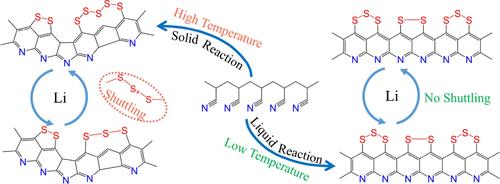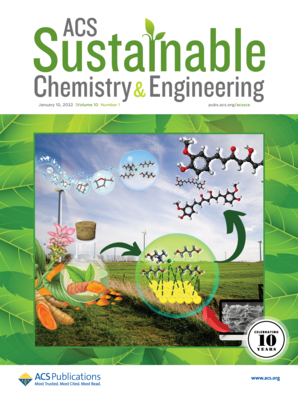通过液相环化合成用于先进阴极材料的高环化聚丙烯腈
IF 7.3
1区 化学
Q1 CHEMISTRY, MULTIDISCIPLINARY
引用次数: 0
摘要
基于固-固反应的硫化聚丙烯腈(SPAN)因其无穿梭效应的优点而受到广泛关注。然而,SPAN 在制备过程中使用固态聚丙烯腈原料,导致硫化效率较低。同时,环状多胺和共轭多烯的形成、交联副反应和聚合物降解等一系列副反应阻碍了理想梯形共轭主链结构的形成。本研究提出了一种液相环化方法来制备 SPAN 材料(SPAN-L)。利用液相条件下反应活性高的特点,大大降低了反应温度,从而抑制了高温引起的一系列副反应,提高了 SPAN 结构的规整性。SPAN-L 阴极具有良好的结构规整性和均匀的硫分布,这有助于提高其导电性和硫利用率。此外,原位拉曼和 XPS 分析表明,SPAN-L 在循环过程中具有稳定的 C-S 键,这表明电极的稳定性得到了增强。本研究通过调整反应环境合成了性能更高的 SPAN 阴极材料,与固相方法相比,其电子传导性、硫利用率和循环稳定性更好。本文章由计算机程序翻译,如有差异,请以英文原文为准。

Synthesis of Highly Cyclized Polyacrylonitrile via Liquid-Phase Cyclization for Advanced Cathode Materials
Sulfurized polyacrylonitrile (SPAN) based on a solid–solid reaction has attracted wide attention due to its advantages of no shuttle effect. However, the solid-state polyacrylonitrile raw material is used during the preparation of SPAN and results in a low vulcanization efficiency. Meanwhile, a series of side reactions such as the formation of cyclic polyamines and conjugated polyenes, cross-linking side reactions, and polymer degradation prevent an ideal trapezoidal conjugated main-chain structure. In this work, a liquid-phase cyclization method is proposed to prepare SPAN materials (SPAN-L). The reaction temperature is significantly lowered by leveraging the high reactivity characteristics under liquid-phase conditions, thereby inhibiting a series of side reactions caused by high temperature and improving the structural regularity of SPAN. The SPAN-L cathode has good structural regularity and a uniform sulfur distribution, which contribute to its enhanced electrical conductivity and high sulfur utilization ratio. Additionally, ex situ Raman and XPS analyses reveal stable C–S bonds in SPAN-L during cycling, indicating enhanced electrode stability. This study synthesizes SPAN cathode materials with enhanced performance by adjusting the reaction environment, showing better electronic conductivity, sulfur utilization, and cycle stability than the solid-phase methods.
求助全文
通过发布文献求助,成功后即可免费获取论文全文。
去求助
来源期刊

ACS Sustainable Chemistry & Engineering
CHEMISTRY, MULTIDISCIPLINARY-ENGINEERING, CHEMICAL
CiteScore
13.80
自引率
4.80%
发文量
1470
审稿时长
1.7 months
期刊介绍:
ACS Sustainable Chemistry & Engineering is a prestigious weekly peer-reviewed scientific journal published by the American Chemical Society. Dedicated to advancing the principles of green chemistry and green engineering, it covers a wide array of research topics including green chemistry, green engineering, biomass, alternative energy, and life cycle assessment.
The journal welcomes submissions in various formats, including Letters, Articles, Features, and Perspectives (Reviews), that address the challenges of sustainability in the chemical enterprise and contribute to the advancement of sustainable practices. Join us in shaping the future of sustainable chemistry and engineering.
 求助内容:
求助内容: 应助结果提醒方式:
应助结果提醒方式:


